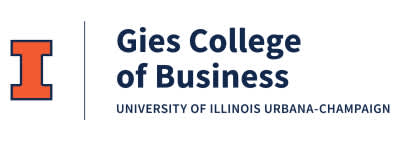Enroll by July 18, 2024
Class starts August 26, 2024
12-24 months
Minimum time to complete. May vary depending on course load and start date.
$10,200
Tuition and fees are subject to change.
100% online
Faculty teach live classes and offer weekly office hours.
The accounting program from Gies College of Business is consistently ranked among the top three in the United States by U.S. News & World Report.
Curated, stackable content
This certificate stacks directly into the full Master of Business Administration (iMBA), Master of Science in Accountancy (iMSA), or Master of Science in Management (iMSM) from the University of Illinois. Upon completion of this certificate program, you can take 12 credit hours of completed work and apply that toward one of those degrees now or in the future.
Hands-on practice
Through projects, exercises, and case studies, you’ll build the experience and confidence to apply what you learn in the program on the job.
Top faculty
The University of Illinois’ accounting faculty is ranked as the No. 3 accounting faculty in the United States (BYU Accounting Faculty Research Rankings). Faculty teach live classes and offer weekly office hours, and teaching staff are available to provide support as needed.

Program description
Overview
In the Taxation Graduate Certificate program, you'll have the chance to develop your skills and understanding of the U.S. federal tax system and how it impacts individuals, employees, and sole proprietors. You'll be exposed to the U.S. federal income tax treatment of corporations and pass-through entities, as well as state and local income tax laws that apply across the U.S. Plus, you'll learn about tax planning techniques, issues, and government policies that shape doing business internationally. By completing this certificate program, you'll not only improve your technical tax knowledge but also gain valuable experience through hands-on learning opportunities.
You’ll benefit from access to rich on-demand content and live interactive sessions with faculty as well. As you work through in-depth exercises and case studies, you’ll receive actionable feedback from teaching staff and fellow learners too.
Earning your certificate qualifies as continuing professional education for CPAs, and the curriculum also meets the needs of non-accounting professionals. Upon successful completion of the program, you may apply up to 12 credits towards the CPA educational requirements for licensure.
This certificate stacks directly into the full Master of Business Administration (iMBA), Master of Science in Accountancy (iMSA), or Master of Science in Management (iMSM) from the University of Illinois.
Learners should complete courses in the listed order. Pre-requisites for both ACCY 507 and ACCY 550 will be enforced.
Required background
To be admitted to this certificate program, you must already hold a bachelor's degree. Professional accounting experience, skills, or knowledge is preferred.
Skills you will gain
- Knowledge of the federal tax system (for individuals, employees, and sole proprietors)
- Tax treatment of corporations and pass-through entities
- State and local income tax laws
- Tax treatment, issues, and planning techniques for international business
- Government policies for international business
- Professional tax practice responsibilities and ethics
Complete 4 required courses
Course 1 of 4
ACCY 505: Federal Taxation
Overview
During the first half of this course, you’ll examine the U.S. federal tax system as it relates to individuals, employees, and sole proprietors. Topics include the tax environment, sources of tax law, inclusions and exclusions to gross income, deductions, calculating the tax liability, employee and self-employed business expenses, and retirement plans.
Through the second half of the course, you’ll analyze the U.S. federal tax system as it concerns property transactions of business owners and shareholders. Topics include cost recovery (e.g., depreciation, amortization, and depletion), realized versus recognized gains and losses, adjusted-basis considerations, non-taxable transactions (e.g., like-kind exchanges, involuntary conversions, and sale of primary residence), and the netting process for gains and losses.
You’ll take this course in two eight-week sections. Completion of both sections (Part A and Part B) is required to earn four credit hours. Taking each section in sequence and back-to-back is recommended.
Course 2 of 4
ACCY 507: Taxation of Business Entities
Overview
In the first half of this course, you’ll explore the U.S. federal income taxation of corporations and their shareholders. You’ll concentrate on the relevant provisions of Subchapter C of the Internal Revenue Code, as well as related treasury regulations and judicial opinions, governing corporate formation, operations, distributions, and liquidation.
For the second half of the course, you’ll study the U.S. federal income taxation of pass-through business entities, including Subchapter S corporations, partnerships, and limited liability companies. You’ll focus on the relevant provisions of Subchapters S and K of the Internal Revenue Code, as well as related treasury regulations and judicial opinions governing the formation, operation, and termination of pass-through entities. With practical in-class study problems, you’ll discover technical tax knowledge along with the development of a variety of professional skills and attitudes.
You’ll take this course in two eight-week sections. Completion of both sections (Part A and Part B) is required to earn four credit hours. Taking each section in sequence and back-to-back is recommended.
Course 3 of 4
ACCY 550: Multistate Taxation
Overview
This course examines state and local tax laws prevalent in the United States. The course will consider the historical progression of state and local taxation, the power of states to tax (and the limitations on that power), and planning strategies for minimizing the impact of state and local taxation. Income taxes are emphasized; however, other taxes such as sales and use taxes and property taxes will be discussed.
Course 4 of 4
ACCY 554: International Taxation
Overview
This course analyzes the tax treatment, issues, planning techniques and underlying government policies involved in doing business internationally. The course incorporates concepts learned in all of the tax courses as they relate to the impact on cross border outbound transactions (i.e., the taxation of US taxpayers doing business abroad). Topics include the source of income, transfer pricing, controlled foreign corporations (CFCs), Subpart F income, foreign tax credits, Global Intangible Low-Taxed Income (GILTI), Base Erosion and Anti-Abuse Tax (BEAT), and Foreign Derived Intangible Income (FDII).
The certificate stacks directly into the iMBA, iMSA, or iMSM programs from the University of Illinois.
Master of Business Administration (iMBA) - As a student in the iMBA program, you’ll build the advanced skills needed to thrive in leadership roles and be qualified to hold a variety of managerial and executive positions. Poets & Quants, a leading authority on management education, selected the iMBA program as the 2022 MBA Program of the Year and named it the No. 1 Biggest B-School Innovation of the Decade.
Master's of Accounting (iMSA) - Through the online Master of Science in Accountancy (iMSA) program, you can hone skills in analytical thinking, data mining, and strategic accounting. This accounting degree is intentionally flexible to address your needs—whether you seek to begin your career as an accountant, become a CPA, improve your standing in the accounting field and become a CFO, or leverage analytical skills in your existing non-accounting career.
Master of Science in Management (iMSM) - As an iMSM student, you will take a series of fundamental management classes covering subjects such as leadership and teams, marketing management, strategic management, process management, and more. You’ll also take foundational classes in accounting and finance. You will then have the opportunity to customize your degree by taking elective courses focused on topics like global business challenges or data-driven decision-making and communications.

Certificate
Taxation Graduate Certificate
Taxation Graduate Certificate Certificate allows you to earn credit directly towards the:
